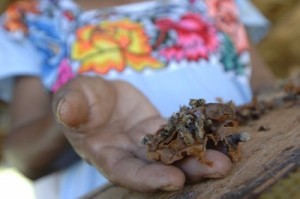
Monsanto’s bitter seeds have given another blow to the Mexican honeycreepers that had previously succeeded in stopping short the transnational corporation’s plan to plant 253,000 acres of transgenic soybeans in the Yucatan Peninsula that would have jeopardized beekeeping in the region, the main livelihood of more than 25,000 families. Read More here: https://www.americas.org/es/archives/6670
A clever combination of social and legal management waged by over 60 organizations of honey producers managed to suspend by means of protection to appeal an authorization that would have granted Monsanto free trade of their genetically modified soy that would affect beekeepers in the states of Chiapas, Campeche, Yucatan and Quintana Roo. The Secretariat of Agriculture, Livestock, Rural Development, Fisheries and Food (SAGARPA) of the federal government had issued the authorization.
But the power of the transnational corporation again showed its effects. Last week, the First District Court of Yucatán denied federal protection to honey producers and gave the green light to the planting of Monsanto’s GM soybeans in the state.
The plaintiffs had argued against the unconstitutionality of the SAGARPA permit for its violation of environmental laws and the precautionary principle. In addition, they argued against the breakdown of the right of indigenous peoples to be consulted, the denial of the right to work and the omission of negative opinions regarding the planting of transgenic soybeans issued by the National Commission of Natural Protected Areas and the National Commission for the Knowledge and Use of Biodiversity. The final resolution from the judge dismissed the allegation.
The protection appeal was filed in district courts on Monday February 27, 2012, and was signed by farmers, indigenous groups, traders and exporters of honey from the Yucatan peninsula. In 1998, Monsanto began planting experimental transgenic soybeans, in 2010 it began the pilot phase of the project and in May of this year SAGARPA granted permission to the commercial planting, which also included the use of 13,075 tons of seed. In June the operation was granted provisional suspension and now the U.S. company’s lobbyists have taken away the legal defense of honey producers.
The influx of transgenic pollen soy pales poorly in the shadow of the quality of Mexican honey. Mexico is the third largest exporter of honey, 40% of domestic production is obtained from Yucatan, Campeche and Quintana Roo, and 98% of the honey that comes from the Yucatan Peninsula is exported to the European Union. The release of transgenic grains will ruin the beekeeping sector that is essential not only for the economy and agriculture but also for the conservation of ecosystems. The European Union plans to either ban the honey contaminated with GM pollen or require it to be labeled upon distribution as it did late last year, the decision has affected the population dependent on the production and export of honey. According to a report by the Ministry of Economy, 26,800 tons were exported in 2011 with a value of about $ 90 million – in light of irresponsibility of the federal government and the interests of the transnational corporation, none of this matters.
Alfredo Acedo is media director and adviser to the National Union of Autonomous Regional Peasant Organizations in Mexico.
Translation: Nidia Bautista
Read More here: https://www.americas.org/es/archives/6670, CIP Americas Program



